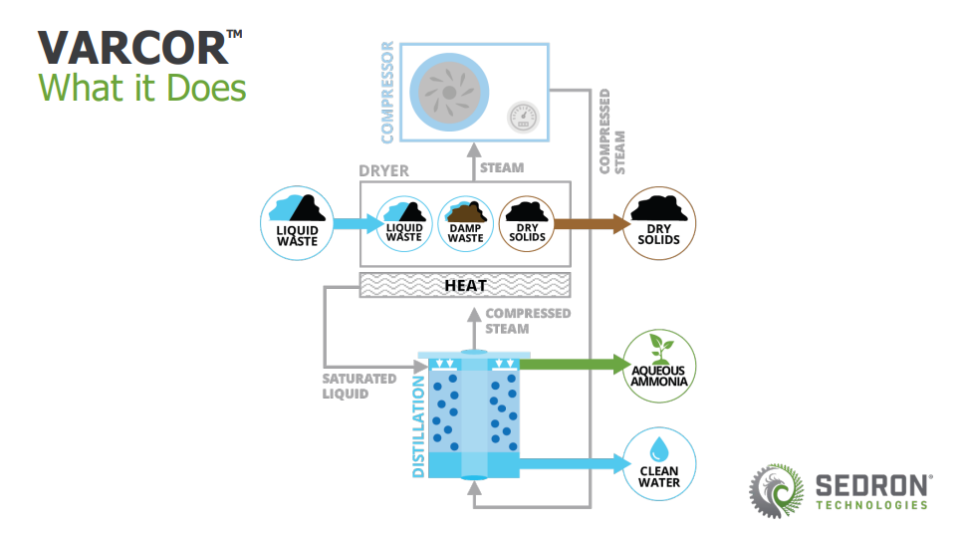Poop processing plant coming to Indiantown. Will it reduce fertilizer water pollution?
Indiantown will be home to the first biosolids processing plant of its kind in Florida, designed to convert treated human waste into concrete, fertilizer and irrigation water.
Sedron Technologies plans to lease 3 acres — with the potential for expansion — at 14843 S.W. 168th Ave. from the Village of Indiantown, according to Village Manager Taryn Kryzda. The village began clearing the land for the project on Dec. 5, according to a public notice issued Dec. 4.
The size, cost and timetable for the plant are unknown, Sedron Technologies Chief Revenue Officer Stanley Janicki told TCPalm. The plant is expected to process about 225,000 wet tons of Class B biosolids and 40,000 wet tons of Class AA biosolids, according to a Sedron Technologies email TCPalm obtained.
Biosolids are what’s left after a wastewater treatment plant treats sewage. Florida doesn’t regulate Class AA biosolids, which are more treated than Class B biosolids and often used as fertilizer.
Florida would need about eight such plants to process all the human waste produced in 2018 alone — which per the National Biosolids Data Project was 412,000 dry tons — according to Gary Roderick, a former Department of Environmental Protection administrator.
The Indiantown plant is touted as a solution for the amassing sewage from 9 million South Florida residents and visitors. Those biosolids currently are burned, sent to landfills or dumped in massive quantities on farms, whose soils typically don’t need that much fertilizer, according to a 2017 TCPalm investigation.
Biosolids contain nitrogen and phosphorus that can run off fields and into waterways, which can fuel toxic algae blooms and muck accumulation at the bottom of Lake Okeechobee.
“What an opportunity for Indiantown to be a leader in bringing this new technology to our region that is so sensitive to excess nutrients in the soil,” said Treasure Coast Regional Planning Council Executive Director Thomas Lanahan.
How Indiantown biosolids plant will work
Sedron Technologies plans to process Class AA and Class B biosolids from wastewater treatment plants, but the company did not specify from which counties.
The company’s Varcor system dries the biosolids, distills the evaporated water and separates the nitrogen and phosphorus so farmers can apply them in more precisely controlled amounts. The end product is lighter and cheaper to ship wherever nutrient-poor soil needs fertilizer.

The water will be used for crops, lawns, gardens, golf courses, pets and livestock, Janicki said. Some biosolids will be burned in kilns for concrete production in place of fossil fuels.
Sedron Technologies operates five other Varcor systems in Indiana; Wisconsin; Seattle, Washington, and the U.S. Virgin Islands.
Janicki also developed an Omni Processor system that converts biosolids into clean drinking water, which Microsoft co-founder Bill Gates sampled at a plant in Dakar, Senegal. Janicki had hoped to sell Florida on the idea, he told TCPalm in 2017, but apparently that didn’t pan out.
“Unlike Mr. Gates, perhaps consumers are not quite ready to taste it,” a company spokesperson said.
Environmental benefits
The Indiantown plant “solves nutrient pollution by stopping the land application of biosolids while simultaneously producing renewable energy and providing the Florida agricultural industry with precision, climate-smart, nitrogen fertilizer,” the company said.
The water and nitrogen have no perfluorinated and polyfluorinated substances, known as PFAS, which are being detected in biosolids across the country. Such “forever chemicals” don’t naturally break down in the environment and have been linked to cancer, liver and immune-system damage and other health issues.
The phosphorus can be shipped elsewhere. That appeals to Florida scientists and environmentalists such as Roderick, who opposes DEP letting farmers dump tons of biosolids on their fields. While their soil may need some nitrogen, it rarely needs that much — or any extra phosphorus, perhaps for the next 20 years, TCPalm’s 2017 investigation found.
“Just think about this somewhere between here and the Mojave Desert out West. There are soils that actually need phosphorus,” Roderick said. “We don’t need phosphorus. ... When you’re dumping all this stuff, and you’re trying to meet nitrogen requirements, you’re just absolutely frying the soils with total phosphorus.”
The Treasure Coast Regional Planning Council called for a statewide ban on spreading human waste on land in 2018. Those demands still stand, Lanahan said.
Indian River County banned biosolids in 2018 after a toxic algae bloom polluted Blue Cypress Lake.
While Sedron Technologies has promised to halt land application of biosolids, the company has not specified who would likely buy its products.
Katie Delk is TCPalm’s environment reporter. Contact her at katie.delk@tcpalm.com or 772-408-5301. Check for updates @katie_delk.
This article originally appeared on Treasure Coast Newspapers: Sedron Technologies to build biosolids processing plant in Indiantown

